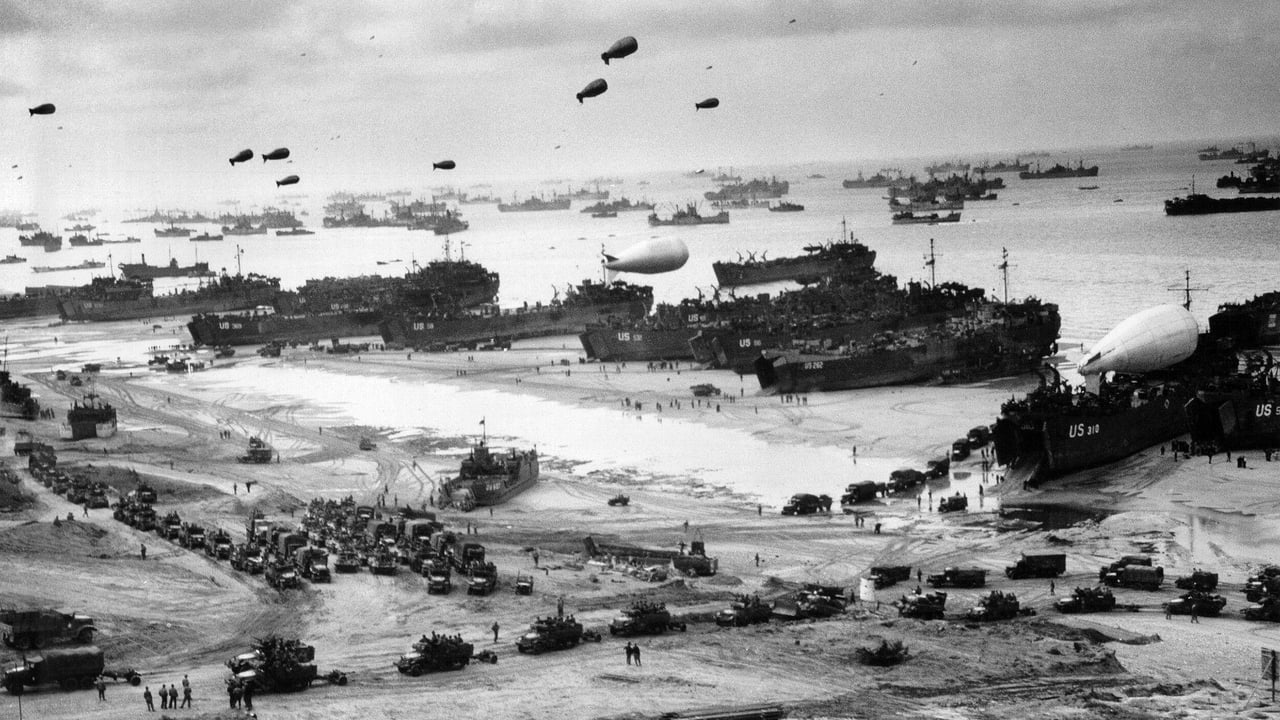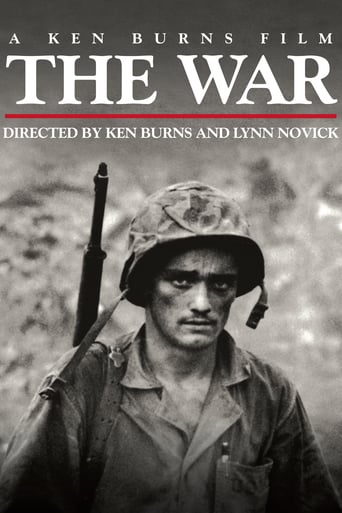

Disturbing yet enthralling
... View MoreEntertaining from beginning to end, it maintains the spirit of the franchise while establishing it's own seal with a fun cast
... View MoreI have absolutely never seen anything like this movie before. You have to see this movie.
... View MoreStrong acting helps the film overcome an uncertain premise and create characters that hold our attention absolutely.
... View MoreI've watched this mini-series at least a half dozen times at this point. Each time, I learn new things. Each time, I'm completely enthralled. There is so much insight, so many things that I did not know about World War II that it is sometimes difficult to absorb everything that's related. And this is, mind you, just from the point of view of the United States and its soldiers, sailors, airmen and Marines.In particular, the first person stories told by those who were there, who fought or were prisoners during the war, are very engrossing. Their stories are poignant, and you genuinely feel their losses and their grief. Even after so many viewings, I frequently find myself tearing up at certain points. This is one of the many things that speaks to the enduring quality of the documentary. Keith David's narration is spot on, providing an anchor that is sometimes necessary considering the material being discussed.In short: I cannot recommend this more. Watch it.
... View MoreThis documentation is well made, this is indisputable. But it is characteristic for US Americans to just see their point of view, skipping everything else. The Second World War was not just USA against Germany and Japan, it was much more complicated. And I expect that a documentation with a length of more than 800 minutes and the title "The War" an all-round view and not just one single view. But I could except this, if at least the documentation of World War 2 would be complete. The war didn't start on Pearl Harbor Day! Europe was until then already two years at war with the Germans winning. But because we see just the American sight, Germany and their Allies just seems weak and it is never clear why the European Countries couldn't handle them themselves. The importance of the Soviet campaign is hardly mentioned. In Contrast the Japanese seems to be the main aggressor of the Second World War. This is maybe true for Australian and US troops, but still Japan was never such a dangerous enemy as the Germans (especially because enough people living in Allied Countries sympathized with the Nazi Regime). It was also no wonder, that Japans aggressive war against China (some people call this the true start of World War 2) from 1937 is also never mentioned.If the movie were, say, 2 hours long, it would be an interesting insight of how the USA experienced the Second World War. But in this nearly 900 minute version, there are too many flaws, which are not acceptable, at least for a Non-American.
... View MoreI still think that the gold standard of WW II documentaries is the 1970's World at War series. Laurence Oliver's ominous Macbeth style of narration set the tone and the 26 episode series covered WW II really well. Critics point out that it showed the war from more of a British point of view. I suppose the fact that Britain and it's dominions were fighting against the Germans and the Japanese for longer than any of the other allies in the Far East, North Africa, the Mediterranean, the Atlantic, Scandinavia and continental Europe is perhaps understandable. If casualties alone was the standard used to measure sacrifice or relevance then the USSR could lay claim to that . Over 15 % of it's population in some form of another perished in the eastern front amounting to millions in a war of annihilation against the Germans. Taking it on it's own I don't think there is a conflict in human history that can match the brutality and barbarism that took millions of lives in such a short space of time. They are all important topics in the context of WW II and they have over the years been excellently covered and narrated by American as well as British production companies. One aspect that has not been really been examined thoroughly is the WW II purely from an American point of view.Ken Burns probably needed to remind a new generation of Americans whose understanding of war is limited to computer games and watching smart bombs and predator drones on TV or on you-tube bombarding specs on the ground from a command center in Florida. In previous wars, Americans endured greater sacrifices. A lot of boots on the ground was the order of the day and American troops encountered huge numbers of well armed and fanatical opponents. Interestingly Burns seemed to focus on four states of the USA, Connecticut, Alabama, Wisconsin and California. I don't know why he picked these these in particular, but probably because it gave a good geographical balance of how it affected the lives of the families and the servicemen in the USA.There is no doubt that mainland USA protected by the vast Atlantic and Pacific oceans had an easier time in WW II than the other allies. The US was never really under a serious threat of either large air raids or invasion. Yes crude attacks were attempted both by the Germans and Japanese but only for propaganda purposes. If it was an accident of geography (and the isolation explains the USA's late entry into the war) lucky for the USA and lucky for the world too! Remember it was a world war and the arsenal of democracy as it was known could offer vital military equipment and manpower for the war effort.From a standing start,(although lend lease to Britain and armament production had been steadily rising since 1940) the USA really got it's industry going on a total war footing. Japan and Germany had a ten year head start in war capacity and training. By 1942 Americans were fighting in North Africa, by 1943 Italy, 1944 France ,as well as doing a bit of island hopping in the pacific to boot and by 1945 it was all over. In fact Americas limitless natural resources, raw materials, manpower (and woman power) and huge industrial potential uninterrupted from air raids were vital. Not only was it important for victory but also in shaping the post-war world, i.e. the Marshall plan. Americas efforts in the aftermath of the war with European and Japanese reconstruction should not be underestimated. The American military with their self confidence, bold ideas, optimism and big band music and might have irritated and annoyed the other allies. In Britain they were over sexed, over paid and over there. However, amusing that might sound it doesn't really go anywhere in telling the whole story. On the cover of this DVD set there is a photograph of a tired and gaunt looking American GI, a far cry from the beaming soldier fresh off the boat in the snazzy uniform out on the town. He could have been from any where in the USA perhaps Connecticut or Wisconsin, but his haunted face tells the story. He was probably in his early 20's wanted to go college or get married, join his fathers business, work on the farm or be a lawyer, perhaps he wanted to be a baseball player. Yet his life was turned upside down, conscripted into the service and after boot camp was shipped off thousands of miles from where he grew up to places he had never heard of! American blood was spilled as far and wide as Iwo Jima, North Africa, Normandy, Bastogne and Guadalcanal, Anzio, Remargen and Midway, just to name a few, ten of thousands of Americans died on land in the air and at sea. American forces were involved in some of the most vicious fighting of the second world war. Victory over Hitler nor Japan could have been achieved without US participation, but the USA couldn't have done it all alone too, allies were vital too.It gives an interesting account of the war from how it impacted the lives of Americans and how they saw it from their point of view. I got the impression from Burns that the US fought harder in the pacific, it was more personal, probably because of pearl harbor but moreover the Japanese were really easy to hate, they were exceptionally cruel to their captives. Well narrated in an easy going style by Keith David. Must movies for Americans to watch after this is THE VICTORS 1963 and finally the very impressive BEST YEARS OF OUR LIVES 1949.
... View MoreThe six letter title ("The War") of this Ken Burns' series is remarkably illustrative of the piece. The title is not "America's War", as would be more apt in some objective sense, but simply "The War" as if you the viewer were an 19-year old American about to be shipped off to some far-off land. To you , there was only one, The War.This seven-part series chronicles World War II through a distinctly American lens. The subjects are mostly common Americans impelled by circumstance of birth but mostly also compelled by a genuine American idealism to make war and suffer loss. What few WW2 veterans remain with us this day may be with us still perhaps a decade or two at most. "The War" gives them one last opportunity to reflect on comrades lost and horrors seen. It gives us as viewers one last opportunity to hear their stories as you might hear your grandparent tell you rather than as the cardboard cut-outs of history books. Typically for Burns', the piece is filled with well chosen period photos, moving images, and music.And yet, as much as we want and need to remember the sacrifices of those who served, I can't help but think that this was the wrong film for Burns' to make. Sure, he will get accolades from veterans groups and politicians the country wide. But Burns should have left the story of American heroics and sacrifice to the sentimentalists - lord knows there are enough of them. A man with Burns' skill should have broadened his ken (no pun intended) to teach his largely American audience some new ways to think about the conflict and its implications for modern society.If an American and, say, a Croat were to start discussing the war today, the American would speak about pride and sacrifice. Even if moderately knowledgeable about history, he'd have perhaps some vague sense that the Yugoslavs were somehow involved. Never in his wildest dreams would he have guessed that the Yugoslav armed forces suffered more dead than the Americans in World War II. And such are the points that need to be made in this age where 9/11, however inherently important it is, should be put into context. 3000 or so people died in 9/11. This is a blip on the radar - a bad few weeks in Iraq or a particularly bad day in any given African conflict. The message that Americans need to learn is not more paeans about the uniqueness and greatness of their sacrifice - but rather more about the universality of it. To be a world leader, America in 2007 needs less navel gazing and more outward understanding."The War" - "America's War" - provided none of this. It also barely touched issues of class and race in any substantive way, other than to give a somewhat embarrassingly lopsided and timid view of the internment of Japanese Americans. We need the Ken Burns' of the world. What am I saying - we need Ken Burns' to do more than pay homage to our great, brave veterans. We need him to tell the stories about ourselves and our world that Americans just don't know.
... View More